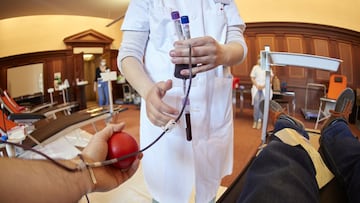Can you donate blood after the covid-19 vaccine?
Blood donations are taking a hit worldwide with uncertainty about being able to donate and concerns about covid-19. Here is what you need to know...

Around the world blood banks are seeing stocks tighten as covid-19 is putting a damper on blood donations and hospitals resume procedures that were put on hold during the pandemic. Eligible blood donors in the US can donate blood, in most cases, any time after they have received an authorized covid-19 vaccine as long as you are “symptom-free and feeling well at the time of donation” according to the Red Cross.
Donating blood, platelets and AB Elite plasma is a lifesaving act, which 6.8 million Americans perform each year, providing 13.6 million units of blood. But this represents just three percent of the population and fresh supplies are always needed. Red blood cells must be used within 42 days of donation, but platelets have only a five-day usability span. The Red Cross fact sheet says that one donation can potentially save up to three lives and that around 36,000 units are needed everyday.
Also see:
- How could full FDA vaccine approval impact the economy and unemployment?
- Is the booster shot the same as the first shot?
- Why can’t kids get vaccinated?
- Pfizer covid-19 vaccine given full FDA approval
What restrictions are there to donate blood after vaccination?
The Red Cross requires that donors “be symptom-free and feeling well at the time of donation.” If you are experiencing any side effects of the covid-19 vaccine received it is asked that you wait until you are feeling better before donating.
Blood can't be stockpiled. Your donation helps ensure patients can be treated when unexpected emergencies happen. Schedule an appointment to give here: https://t.co/ZaH0EVcLwx pic.twitter.com/cFRsU81KcW
— American Red Cross (@RedCross) August 24, 2021
There is no wait time required, in most cases, between getting vaccinated against covid-19 and donating blood if you received one of the following vaccines; AstraZeneca, Johnson & Johnson, Moderna, Novavax, or Pfizer, including a booster. However, you will be required to provide the manufacture’s name of the covid-19 vaccine which you received. If you cannot provide that information, you will be asked to wait two weeks before you will be allowed to donate.
Will donating blood affect the efficacy of the vaccine?
Your antibody levels will not be depleted when you donate blood. The human body has roughly 10 pints of blood and donors provide just 1 pint per donation and the immune system rapidly reproduces antibodies. It takes the body between four and six weeks to fully replace the red blood cells which is why at least eight weeks are required between whole blood donations. Platelet only donations require only a 7-day interval but you can only donate 24 times per year.
“Blood donations gave us more time." Elizabeth's husband received 63 units of blood during his cancer treatment. Now, she gives back by hosting a blood drive in his honor.
— American Red Cross (@RedCross) July 28, 2021
You can help others battling cancer by making an appointment to give: https://t.co/ypUxBKioJJ pic.twitter.com/PvXTiV6qbC
Blood supplies strained by covid-19 pandemic
Related stories
Doctors the world over are sounding the alarm about limited blood supplies. Unlike in the US, some countries force potential donors to wait for a determined time period from when they have their covid-19 shot. Also, fewer are giving blood out of concern over the once again surging number of cases due to the Delta covid-19 variant.
Dr. Claudia Cohn, chief medical officer at AABB, previously known as the American Association of Blood Banks told Reuters that in the US a supply that was already stretched by the pandemic tighten even more as hospitals increased surgeries that had been on hold. The South Korea Red Cross says that it has just 3.2 days' worth of blood on hand, less than half the supply it had this time last year.


